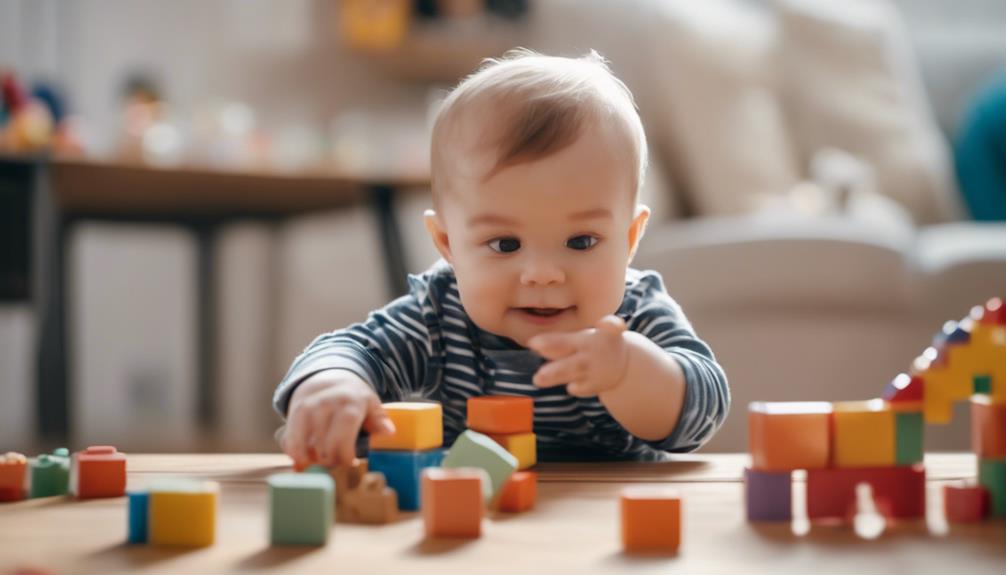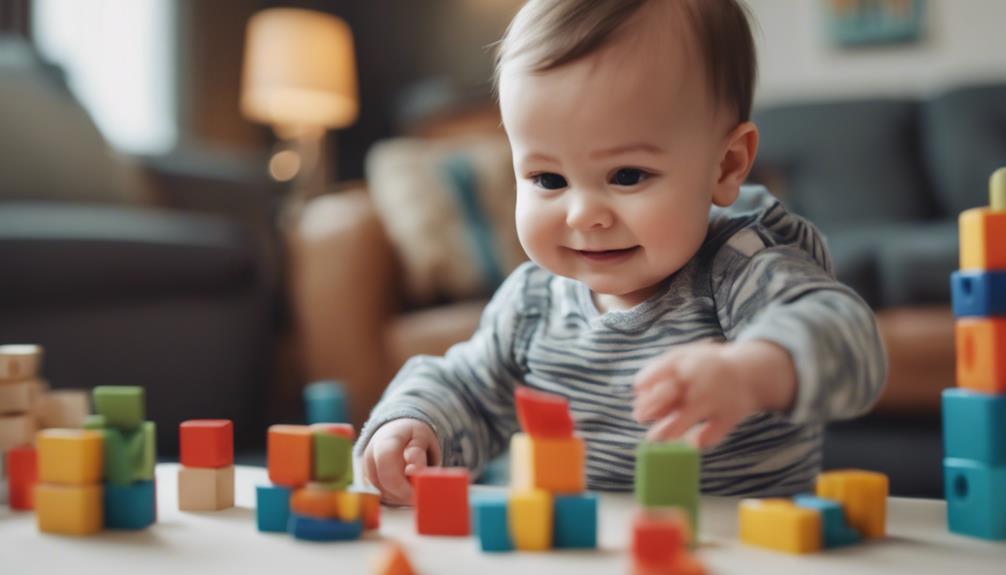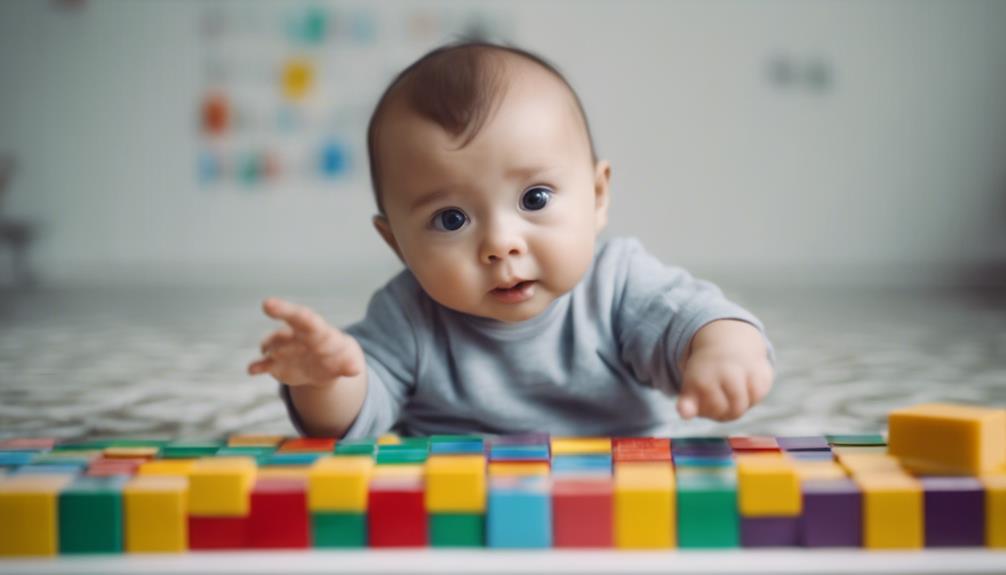If your baby starts cooing at 6 months and is able to put together sentences by 10 months, actively explores their surroundings, responds positively to stimuli, and demonstrates cognitive development by problem-solving, these are key indicators of intelligence. Look for milestones such as using gestures effectively and achieving rapid growth in their vocabulary. Encouraging curiosity and nurturing their unique strengths while celebrating their accomplishments can further promote their overall development. Take note of behaviors like exceptional concentration, emotional awareness, and problem-solving abilities as additional signs of intelligence. Discover more insights by observing the diverse ways in which your baby may demonstrate their intelligence.
Key Takeaways
- Early language milestones like clear sentences by 10 months indicate intelligence.
- Curiosity and eagerness for exploration are signs of a smart baby.
- Advanced responsiveness to stimuli and quick adaptation suggest intelligence.
- Achieving cognitive milestones early, like problem-solving, can highlight intelligence.
- Exceptional behaviors like strong memory retention and problem-solving skills are indicators of intelligence.
Early Language Development
If you want to gauge your baby's intelligence early on, observing their early language development can provide valuable insights.
A baby's ability to communicate and comprehend at an advanced level at an early age can be indicative of heightened cognitive development. Signs of intelligence in language development can manifest as early as 6 months when a child begins babbling. This initial stage of using sounds to communicate sets the foundation for future language skills.
By 10 months, if your baby starts forming clear sentences, it could suggest advanced intelligence. Additionally, rapid vocabulary expansion and accurate pronunciation are key indicators of a gifted child. An enhanced capacity to understand and respond to verbal cues further highlights cognitive aptitude.
Additionally, babies who effectively use gestures to convey their needs and thoughts demonstrate advanced communication skills, which are often linked to intelligence. Monitoring these language milestones can offer valuable insights into your baby's cognitive potential.
Curiosity and Exploration

Highly intelligent babies often demonstrate an insatiable curiosity that drives them to explore and engage with their environment. This innate curiosity is a key indicator of their intelligence, as it fuels their cognitive development and learning process.
When observing your baby's behavior, look for these signs:
- Intelligent babies exhibit a natural inclination towards seeking information and asking challenging questions.
- Curiosity in babies leads them to explore their surroundings eagerly, seeking out new experiences.
- Encouraging exploration through educational tools can further stimulate your smart baby's curiosity.
- Babies with high intelligence often show a keen interest in understanding the world around them.
- Their curiosity not only drives their learning but also contributes significantly to their cognitive development.
Understanding and nurturing your baby's curiosity and exploration can support their intellectual growth and development in the long run.
Responsive to Stimuli

Smart babies who are gifted often display a heightened responsiveness to various stimuli in their environment. These babies show advanced alertness, quickly engaging with new sounds, sights, and experiences. Their heightened sensitivity allows them to react positively and promptly to novel stimuli, indicating a quick adaptation to changes and showcasing cognitive flexibility.
Gifted infants may also demonstrate a quick desensitization to familiar stimuli, seeking out varied experiences to maintain engagement and interest. As a parent, you may notice your baby's immediate interest and awareness in their surroundings, showing a keen ability to process and respond to different stimuli. Encouraging this responsiveness by providing a stimulating environment can further support their cognitive growth and development.
Cognitive Growth Support

Promoting your baby's cognitive growth is essential for their overall development and intellectual advancement. To support your infant's cognitive growth, consider the following key factors:
- Early Language Development: Achieving milestones like clear sentences by 10 months can indicate advanced development in cognitive skills.
- Problem-Solving Abilities: Engage your baby in activities that challenge their problem-solving skills, such as puzzles or simple challenges, to foster their intelligence.
- High Birth Weight: Studies suggest a link between high birth weight and slightly higher IQ, supporting cognitive growth in the long term.
- Encouraging Curiosity: Foster your baby's curiosity by allowing exploration in various subjects, which can aid in the development of their intelligence.
- Communication Skills and Memory Retention: Exceptional communication skills and strong memory retention are vital indicators of cognitive growth in infants.
Individual Strengths Nurturing

To nurture your baby's individual strengths effectively, pay close attention to their unique abilities and interests. Children show signs of high cognitive development in various ways, and as parents, it's important to recognize and support these talents.
Every baby is a natural genius in their own right, with specific strengths that set them apart. By observing your baby's behaviors and responses, you can identify areas where they excel. Providing opportunities for exploration and learning in these areas can help further develop their intelligence.
Encouraging and supporting your baby's talents through positive reinforcement and engaging activities is key to their growth. Celebrate their achievements and milestones as they progress, creating a nurturing environment that fosters their development based on their specific strengths and abilities.
Diverse Manifestations of Intelligence

Intelligence in babies can be displayed through various behaviors and cognitive milestones. From early achievements like sitting up independently to demonstrating exceptional problem-solving skills, there are diverse manifestations of intelligence to look out for.
Keep an eye out for advanced focus, curiosity, and the ability to ask complex questions as signs of your baby's developing intellect.
Intelligence in Behavior
Understanding the diverse manifestations of intelligence in behavior can provide valuable insights into identifying cognitive abilities in babies. When observing your little one, keep an eye out for the following signs of intelligence:
- Exceptional focus: Intelligent babies may exhibit a remarkable ability to concentrate on tasks or objects for extended periods.
- Emotional intelligence: Gifted children might display a deep understanding of emotions, both in themselves and others.
- Strong memory retention: Look for signs of advanced memory skills, such as the ability to remember details or events from the past.
- Vivid imagination: A rich and elaborate imagination can be a key indicator of intelligence in behavior.
- Advanced problem-solving: Intelligent babies may surprise you with their ability to solve complex problems or puzzles at a young age.
Cognitive Development Milestones
Achieving cognitive development milestones in babies can reveal diverse signs of intelligence. Gifted babies often reach these milestones earlier than their peers, showcasing signs of a smart and intelligent baby.
Developmental and Cognitive Characteristics play an important role in identifying highly intelligent infants. Parents may notice signs quite early, such as infants displaying advanced problem-solving skills or exhibiting exceptional curiosity.
For instance, some babies may start sitting up alone at three months or form clear sentences by the age of 10 months, indicating intelligence in children.
Encouraging communication skills through activities like reading and talking can further nurture their intelligence. Additionally, infants showing an advanced ability to focus at a young age may also exhibit signs of intelligence.
Highly intelligent babies might surprise adults with their complex questions, demonstrating a thirst for knowledge and understanding that sets them apart in their cognitive development journey.
Frequently Asked Questions
How Do I Know if My Baby Is Gifted or Just Smart?
You can tell if your baby is gifted or just smart by observing early milestones, focus abilities, problem-solving skills, social preferences, and curiosity. Look for signs like advanced development, extended focus, independent play, and inquisitive nature.
How to Check Baby IQ Level?
To check your baby's IQ level, observe milestones, problem-solving skills, curiosity, focus, and birth weight. Highly alert babies recognizing faces, making eye contact, and showing emotional intelligence may indicate heightened intelligence. Communication, memory, and curiosity are key indicators.
What Determines How Smart a Baby Is?
You can gauge your baby's intelligence by observing early milestones, birth weight, social behaviors, curiosity, alertness, and bonding patterns. These signs may give you insight into your little one's potential intelligence and cognitive development.
How Do I Know if My 20 Month Old Is Advanced?
To know if your 20-month-old is advanced, watch for early signs like clear sentences, problem-solving skills, exceptional focus, curiosity, and engaging interactions. These indicators can suggest your child is developing at an accelerated pace.
Conclusion
To sum up, recognizing signs of intelligence in your baby can be an exciting journey filled with wonder and discovery.
As you observe their early language development, curiosity, responsiveness to stimuli, and cognitive growth support, remember that each child has their own unique strengths and ways of expressing their intelligence.
Embrace the diverse manifestations of intelligence and nurture your baby's individual talents to help them reach their full potential.
Just like a garden, with the right care and attention, their brilliance will bloom and flourish.










